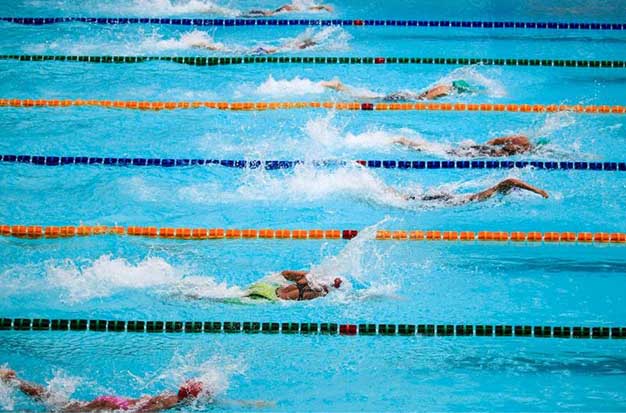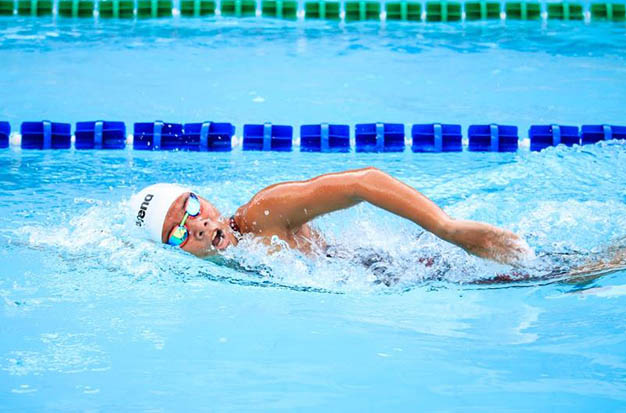Why Does Swimming Make You Tired? (6 Reasons)
Swimming is a revitalizing activity that can also be a great way to exercise in a less strenuous and more enjoyable way. However, swimming has another effect on some people: an increased level of fatigue after getting out of the water. For more information on why you might feel a little tired after swimming, continue reading. We also provide some advice on how to lessen the fatigue you may experience after swimming.
Why Is Swimming So Tiresome? (6 Reasons)
Swimming Is A Full Body Resistance Workout
The strenuous nature of the exercise may be one of the more obvious reasons for the draining post-swim fatigue. You’ll use all of your body’s muscle groups while swimming, especially the larger ones like the back, abdominals, chest, quadriceps, hamstrings, and glutes. These four main swimming strokes are butterfly, backstroke, breaststroke, and freestyle.
An enormous amount of energy will be needed to use all of these muscles at once. Additionally, your body will need to repair itself after a challenging workout, and unlike recovering from other workouts where you only use a few specific muscle groups, your body will need to work on all of its muscles, not just a select few.
Additionally, swimming will put your body under constant resistance because water offers about 12 times as much resistance as air. However, gravity’s pull on your joints is virtually eliminated by the buoyancy of the water, making this exercise low-impact in terms of joint stress.
On the other hand, this results in any movement-related stress shifting to the muscles, making swimming a workout that challenges both aerobic and anaerobic systems of the body and can quickly exhaust you.
Pool Water Temperature
Unbelievably, the temperature of the pool may also contribute to the fatigue you feel after swimming. Because cold water lowers your body’s core temperature and forces it to work harder to warm up, most people assume that being in cold water will make you more tired. The truth is that you can tire out in both warmer and colder water temperatures.
Just as quickly as swimming in too-cold water, swimming in warm water can also result in exhaustion. Warmer water, around 90 degrees, not only increases your risk of exhaustion but also of dehydration (which we will discuss later).
In light of this, if you notice that your pool’s water is either too cold or too hot, it could be a contributing factor to your fatigue after swimming. You should consider “Goldilocks and the Three Bears” when swimming in water. You want the water to be the perfect temperature, not too hot or too cold. The ideal temperature for a highly skilled swimmer is between 77 and 82 degrees. They recommend closer to 85 degrees for swimming in a more leisurely setting or just for a good workout.
If you believe that the temperature of your pool is having an impact on your level of energy, the best thing you can do is to let the maintenance team know and ask what the temperature is usually kept at. That only applies, of course, if you exercise in a facility with an indoor pool. If the weather is turning too hot or too cold while you are swimming in open waters or an outdoor pool, you might want to think about doing your workout in another swimming area.
Dehydration
Many people are unaware of the fact that swimming makes the body sweat more than you might imagine. Swimming doesn’t make you sweat as much as land-based exercises like running, but you still do, according to the Human Kinetics Journal. The difference is that because sweat is quickly removed by the water, swimmers are less likely to notice when they are perspiring.
Since your body will be sweating more than usual while training in warmer water, as was briefly discussed, you will also be much more likely to become dehydrated. Along with causing dehydration, sweating can also result in the loss of important minerals and electrolytes that are crucial for healthy body operation. Fatigue can also result from a mineral deficiency.
Dehydration is one of the main causes of fatigue, according to WebMD. In light of this, it’s possible that you’re dehydrated if you feel tired after a challenging swim workout.
In the same vein, Healthline has discovered that vitamin and mineral deficiencies are a significant contributor to increased fatigue. Iron, magnesium, potassium, vitamin D, and vitamin B12 are just a few of the vitamins that can help with fatigue.
Additionally, studies have shown that athletes frequently have magnesium deficiencies and that intense exercise (like swimming) may require an increased uptake of magnesium of between 10% and 20%.

Lack Of Nutrition Before Swimming
We’ll examine nutrition as our final factor contributing to the exhaustion associated with swimming. Similar to hydration, nutrition is crucial for both the preparation phase of your workout and the actual workout itself.
We discussed a few additional points to take into account if you don’t want to get too tired in our article on “How to Freestyle Without Getting Tired.” Nutrition was one of those. You must first ensure that your body is properly fueled with lean proteins, fruits, and vegetables in order to swim at your best without becoming overtired.
But if you’re going to be swimming for a while, you also need to make sure you’re fueling yourself before and during your workout. While some people prefer to exercise when they are starving, others may find that it makes them feel drained and fatigued. Make it a top priority to eat a nutritious pre-workout snack if you are experiencing this. Put nutrition first, and your performance and energy will improve.
Workout Intensity
Workout intensity in swimming refers to swimming speed rather than distance. The same is true for weightlifting; intensity is frequently described as the amount of weight you lift rather than the volume of work you put in.
Although it may seem counterintuitive, many swimmers report feeling more energized following a challenging workout than an easy one. This effect is known as excess post-exercise oxygen consumption among scientists and simply as after-burn to most other exercise enthusiasts out there.
Even though you are physically exhausted the night after a challenging workout or race, if you have ever experienced after-burn, you may find it difficult to fall asleep. Before your body returns to its normal resting state, the afterburn effects typically last anywhere from 30 minutes to 24 hours.
Swimming Under The Sunshine
According to Sleep, many people report feeling sleepy and exhausted after being in the sun.org does, in fact, seem to be true. Sun exposure can also result in chemical changes in the body that can contribute to fatigue, in addition to some of the more obvious causes that we have already discussed, like overheating and dehydration.
However, despite swimming indoors for the majority of the year, many swimmers still report feeling exhausted after a swim.
What Can I Do To Minimize Post-swimming Fatigue
If you feel exhausted after swimming, there’s nothing wrong with taking a quick nap. There are some things you can do, though, if you’d rather lessen or eliminate your level of fatigue following a swim. One choice is to go swimming first thing in the morning after a protein-rich breakfast. This increases your metabolism, which will give you more energy to make up for the additional energy required for swimming. After swimming, you might feel less worn out if:
• Splitting up your swimming routine into more than one session so you’re not overexerting yourself
• Getting a good night’s sleep so you’ll be well rested when you swim
• Having an energy bar or drink after you’re done swimming to get an added energy boost to offset fatigue
Conclusion
After a good swim workout, it’s common for swimmers to feel exhausted and sleepy. Remember that everyone will experience fatigue differently after a swim workout and that there is typically not one single cause but rather a combination of factors that can contribute to it.
I advise putting some of these suggestions into practice and testing them out for yourself to see which ones work best for you or if you can identify the precise reason why you get sleepy and exhausted after swimming. In general, many of these suggestions are simply wise to put into practice and will improve your swimming regardless of whether they lessen your post-workout fatigue.
